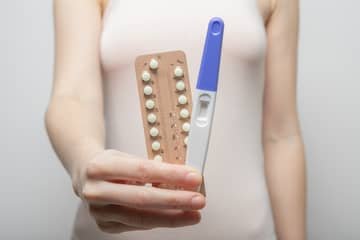
What about toothache during pregnancy. Is anesthesia at the dentist, tooth extraction or X-ray a risk for the child?
It is said that each pregnancy costs the expectant mother one tooth. The most common reasons for tooth decay during pregnancy are morning sickness, hormones and insufficient dental hygiene. Bleeding and inflammation of the gums during pregnancy, which affect more than a third of women expecting a baby, are related to the increased level of the hormones progesterone and estrogen.
There are many superstitions about teeth circulating among women, which future mothers are worried about. What about dental x-rays and painkillers? Is teeth whitening allowed during pregnancy? Should you worry about tooth extraction during pregnancy?
Dental problems during pregnancy - causes
One of the causes of dental problems during pregnancy is improper dental care and neglected teeth before pregnancy. Teeth should be taken care of during pregnancy at least as much, if not more, than before pregnancy. It is necessary to undergo regular dental preventive examinations and visit a dental hygienist.
Pregnant women may have more bleeding and swollen gums due to increased hormone levels. This can make brushing difficult and lead to more plaque build-up, which worsens gingivitis. It should be emphasized that gum disease is not caused by pregnancy, during which the symptoms of already existing inflammation only worsen.
Many women change their eating habits during pregnancy. Women usually try to live healthier, but different pregnancy cravings can be heard. Excessive consumption of sour and sweet foods is closely related to the development of dental caries. Sugars are a breeding ground for bacteria that cause tooth decay. If this is combined with a decrease in oral hygiene care, caused by fatigue and a decrease in overall performance during pregnancy, the result can be a faster deposition of dental plaque and an increase in the number of microorganisms in the oral cavity.
Morning sickness also affects dental health - frequent exposure of teeth to stomach acids can lead to tooth enamel erosion. It is a dental disease that causes disruption and gradual loss of dental tissues. Stomach acids cause a drop in pH and a slight softening of the enamel, therefore it is not recommended to brush the teeth immediately after vomiting. It is better to rinse your mouth with plain water, or mouthwash with fluoride. It is advisable to start brushing your teeth only after 20-30 minutes, when the acidic environment in the mouth has adjusted.

Bad teeth affect the fetus
Harmful bacteria that form in the mouth can affect the course of pregnancy. They can pass into the bloodstream and penetrate the placenta to the fetus. The consequence can be serious diseases in the mother's body and danger to the fetus. Untreated periodontitis or any inflammatory focus increases the likelihood of premature birth and low birth weight of the newborn.
Myths about toothache during pregnancy
Severe toothache during pregnancy should not be underestimated. The most effective means is, of course, prevention. If you make an appointment for a preventive check-up even before pregnancy or at least in its early stages, you can detect potential problems in time. If you already have a damaged tooth during pregnancy, you should make an appointment with a dentist as soon as possible. A number of superstitions cause anxiety among expectant mothers. Which "guaranteed truths" about pregnancy teeth are not true?
Each pregnancy costs a woman one tooth
Since pregnancy does not cause caries or periodontitis, it is not true that pregnancy automatically leads to tooth loss. By brushing your teeth in the morning and in the evening and cleaning the interdental spaces with interdental brushes, you can prevent cavities. If tooth decay is present, it must be treated. This also applies to gingivitis or periodontitis. Tooth loss can therefore be avoided not only during pregnancy.
You should brush your teeth properly after every vomiting
Pregnancy nausea appears most often in the 1st trimester, women in this period may vomit several times a day. It is therefore recommended to undergo 2 preventive examinations - at the 12th and 28th week of pregnancy. When vomiting, acid enters the oral cavity, which etches tooth enamel. Brushing immediately could weaken the teeth and wear away the etched enamel. You won't have to worry about negative effects if you rinse your mouth with clean water or mouthwash at the first moment, start cleaning after at least 20 minutes.

Teeth decay more during pregnancy
It's not like that. By regularly brushing your teeth in the morning and in the evening, taking care of the spaces between your teeth and using mouthwash, you can prevent tooth decay. It is important to visit the dentist regularly and not neglect dental hygiene.
Gums bleed more during pregnancy
The increased level of hormones affects the deepening and acceleration of inflammatory processes in the body. During pregnancy, the problem that was a reality before pregnancy is only accentuated.
X-rays of teeth during pregnancy and painkillers are prohibited
Only one of these statements is true. Although the doses of X-ray radiation are very low with the devices used in dentistry and the beam only targets the area of the jaws, so it has no effect on the fetus, a woman should not undergo any X-ray examination during pregnancy. Painkillers are tolerable in the higher stages of pregnancy. In the case of minor caries, you cannot avoid tooth filling during pregnancy. Depending on the length, your dentist will recommend a suitable pain reliever during pregnancy. At a more advanced stage of pregnancy, a wider spectrum of drugs is available. If you want to avoid medication during pregnancy, you should know that drilling without local anesthesia is a huge shock to the body. A stress hormone begins to be released from the cortex of the adrenal glands, which adversely affects the blood supply to the fetus. Anesthesia at the dentist during pregnancy thus has less effect on the woman's body and the fetus.
Teeth whitening during pregnancy
The effect of whitening agents on the fetus is not exactly known, but due to the higher risk of weakened tooth enamel and gums, teeth whitening is not recommended during pregnancy. This applies to both dental and home teeth whitening with the help of home whitening kits. Teeth whitening during pregnancy is not a necessity, so there is no need to take unnecessary risks and it is better to wait for the procedure after pregnancy and breastfeeding. Alternatively, you can use specialized whitening toothpastes that are gentle on tooth enamel.

What about toothache during pregnancy
Toothache is not only a symptom during pregnancy that needs to be addressed as soon as possible. Whether it is a suspicion of tooth decay or a general hypersensitivity, dental problems must be addressed. Injection or anesthesia at the dentist during pregnancy is the solution when it comes to tooth extraction during pregnancy or filling. In addition to visiting the doctor, compresses or natural remedies and herbs can help you with toothache (especially with tooth sensitivity).
- Ice and warm compresses: Compresses are helpful for toothaches caused by increased sensitivity. In case of pain in one tooth, choose a cold compress or rinse with ice, in case of tooth sensitivity, a warm compress is suitable.
- Natural remedies and herbs: Chewing garlic and onion, rapeseed and chamomile, as well as ginger solution can be used for toothaches and toothaches as well as their increased sensitivity.
- Minerals and vitamins: During pregnancy, you should increase your intake of vitamins C and D, as well as the minerals calcium and fluoride, which have a beneficial effect on dental health.
- Painkillers: Some over-the-counter painkillers are also suitable during pregnancy. Of course, you don't need to overdo it and you should always address the cause of the pain, but they can be useful as first aid. Medicines based on paracetamol are suitable, e.g. Paralen.
Toothache during pregnancy - experience
Expectant mothers most often recommend Paralen for toothache, according to them, a cold compress is also helpful. Despite the fact that cloves are generally not recommended during pregnancy, some of the pregnant women chewed them for toothache. Alpa (rubbing the sore spot) or gel for teething are also proven.
The most frequent questions - FAQ
Any problems in the oral cavity - pain in the teeth and gums are unpleasant not only during pregnancy. Whether it is a toothache in the 9th month or bleeding gums in the beginning of pregnancy, you should not delay solving the problem. In the article, we told you why toothaches occur during pregnancy and how to deal with them. If you are interested in anything else about this topic, or if you want to share your experience with toothache during pregnancy, you can comment below the article.
Do hormonal changes during pregnancy affect the teeth?
How to prevent erosion during pregnancy?
Is it true that the child pulls calcium from the mother's teeth?
Pridať komentár






